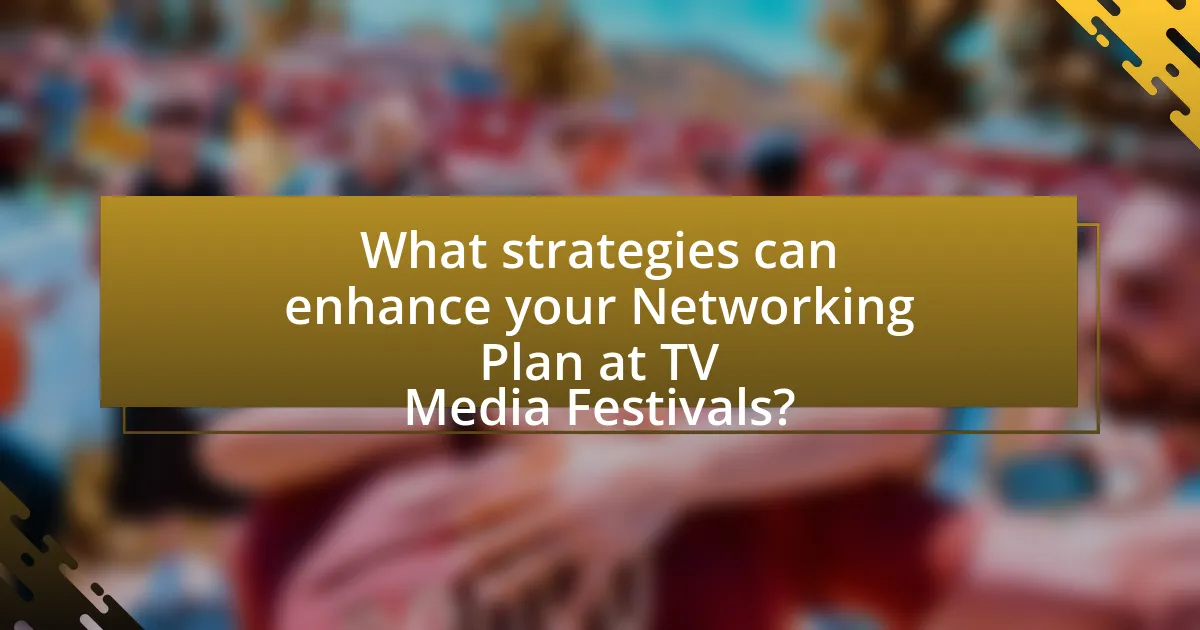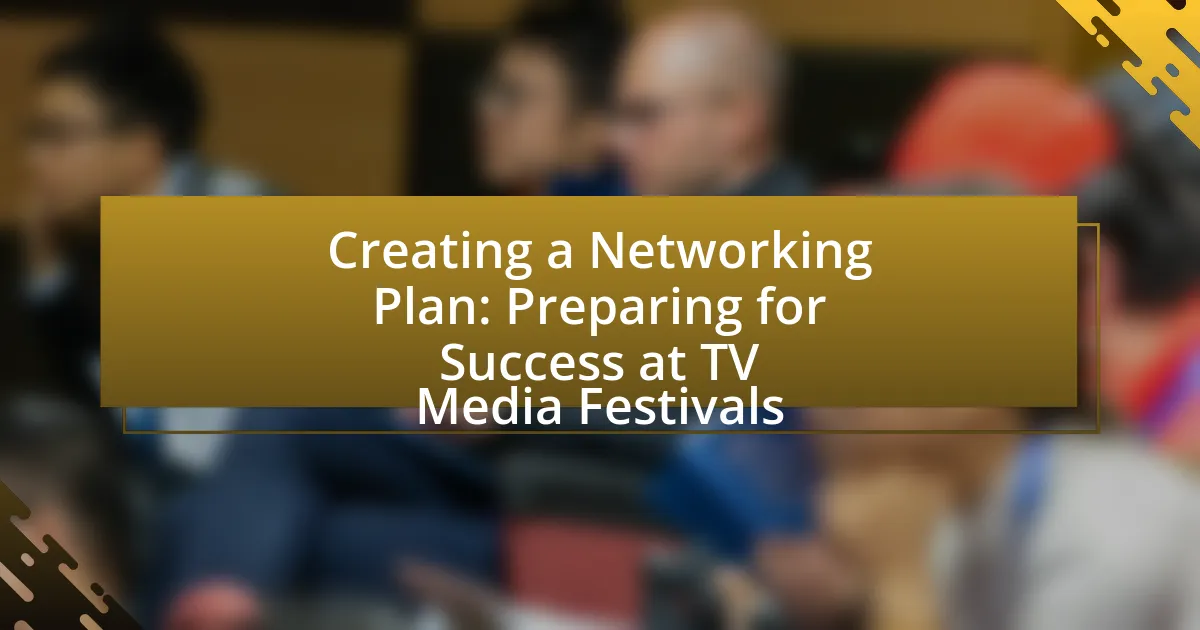A Networking Plan for TV Media Festivals is a strategic framework aimed at fostering connections among industry professionals such as producers, directors, and distributors. This article outlines the essential components of an effective Networking Plan, including goal setting, audience identification, and relationship-building strategies. It emphasizes the importance of networking in the media industry, where a significant percentage of job opportunities arise from professional connections. Additionally, the article provides practical steps for creating a tailored Networking Plan, highlights common goals, and discusses metrics for measuring success, ultimately guiding attendees on how to maximize their networking efforts at TV media festivals.

What is a Networking Plan for TV Media Festivals?
A Networking Plan for TV Media Festivals is a strategic outline designed to facilitate connections among industry professionals, including producers, directors, and distributors, during the festival. This plan typically includes identifying key individuals to meet, scheduling meetings or informal gatherings, and preparing tailored pitches or presentations to effectively communicate one’s projects and goals. The importance of a Networking Plan is underscored by the fact that over 70% of job opportunities in the media industry arise from networking, highlighting its critical role in career advancement and project collaboration.
Why is a Networking Plan essential for success at TV Media Festivals?
A Networking Plan is essential for success at TV Media Festivals because it strategically outlines how to connect with industry professionals, which can lead to valuable partnerships and opportunities. By identifying key individuals and organizations to engage with, attendees can maximize their interactions and ensure they are making meaningful connections that can enhance their career prospects. Research indicates that networking is a critical factor in career advancement, with studies showing that up to 70% of jobs are found through networking. Therefore, a well-structured Networking Plan not only facilitates targeted outreach but also increases the likelihood of achieving specific goals at these festivals.
What are the key elements of an effective Networking Plan?
The key elements of an effective Networking Plan include clear objectives, targeted audience identification, strategic outreach methods, relationship-building strategies, and follow-up protocols. Clear objectives define what the networking effort aims to achieve, such as securing partnerships or gaining industry insights. Targeted audience identification involves pinpointing specific individuals or groups relevant to the goals, such as producers or fellow creators at TV media festivals. Strategic outreach methods encompass various channels, including social media, email, and in-person events, to connect with the identified audience. Relationship-building strategies focus on creating meaningful connections through genuine interactions and shared interests. Finally, follow-up protocols ensure that initial contacts are nurtured, fostering ongoing relationships that can lead to future opportunities. These elements collectively enhance the effectiveness of networking efforts in the context of TV media festivals.
How does a Networking Plan differ from general networking strategies?
A Networking Plan is a structured approach tailored to specific goals and contexts, while general networking strategies are broader, more flexible methods for building professional relationships. The Networking Plan focuses on identifying key individuals, setting measurable objectives, and outlining specific actions to achieve networking goals, particularly in the context of events like TV media festivals. In contrast, general networking strategies may include informal interactions and diverse tactics that are not necessarily aligned with specific outcomes or events. This distinction is crucial for maximizing effectiveness in targeted networking scenarios, as evidenced by successful networking outcomes reported by participants at industry events who utilized detailed plans versus those who relied on general strategies.
What are the common goals of a Networking Plan at TV Media Festivals?
The common goals of a Networking Plan at TV Media Festivals include establishing industry connections, promoting projects, and gaining insights into market trends. Establishing industry connections allows participants to build relationships with key stakeholders, such as producers, directors, and distributors, which can lead to future collaborations. Promoting projects is essential for gaining visibility and attracting potential investors or partners, as festivals provide a platform to showcase work to a targeted audience. Gaining insights into market trends helps participants understand audience preferences and industry shifts, enabling them to adapt their strategies effectively. These goals collectively enhance the chances of success in the competitive media landscape.
How can setting clear objectives enhance networking outcomes?
Setting clear objectives enhances networking outcomes by providing a focused direction for interactions and measurable goals for success. When individuals define specific objectives, such as identifying potential collaborators or gaining industry insights, they can tailor their networking strategies accordingly. Research indicates that goal-setting significantly increases the likelihood of achieving desired outcomes; for instance, a study published in the Journal of Applied Psychology found that individuals who set specific goals were 90% more likely to achieve them compared to those who did not. This structured approach allows for more meaningful connections and effective follow-ups, ultimately leading to stronger professional relationships and opportunities in the TV media festival context.
What metrics can be used to measure the success of a Networking Plan?
Metrics that can be used to measure the success of a Networking Plan include the number of new connections made, the quality of those connections, follow-up engagement rates, and the achievement of specific networking goals. The number of new connections indicates the breadth of the network, while the quality can be assessed through the relevance and potential of those connections to future opportunities. Follow-up engagement rates, such as responses to outreach or meetings scheduled, reflect the effectiveness of initial interactions. Achieving specific networking goals, such as securing partnerships or collaborations, provides concrete evidence of the plan’s success. These metrics collectively offer a comprehensive view of the Networking Plan’s effectiveness in fostering valuable relationships within the context of TV Media Festivals.

How do you create a Networking Plan for TV Media Festivals?
To create a Networking Plan for TV Media Festivals, first identify your goals, such as building relationships, finding collaborators, or promoting your work. Next, research the festival’s attendees, including industry professionals, potential partners, and influencers, to tailor your approach. Develop a schedule that includes key events, panels, and networking opportunities, ensuring you allocate time for meaningful interactions. Prepare your elevator pitch and materials, such as business cards and a portfolio, to effectively communicate your value. Finally, follow up with contacts post-festival to maintain relationships and explore collaboration opportunities. This structured approach enhances your networking effectiveness and increases the likelihood of achieving your objectives at the festival.
What steps should be taken to develop a Networking Plan?
To develop a Networking Plan, first identify your networking goals, such as building relationships with industry professionals or seeking collaboration opportunities. Next, research relevant events, like TV media festivals, to determine where your target audience will be present. Then, create a list of key contacts you want to connect with, including their roles and how they align with your objectives. After that, prepare your elevator pitch and materials, such as business cards or portfolios, to effectively communicate your value. Finally, establish a follow-up strategy to maintain connections after the event, ensuring you nurture relationships for future opportunities. These steps are essential for maximizing networking effectiveness and achieving desired outcomes in the media industry.
How do you identify key contacts and opportunities at the festival?
To identify key contacts and opportunities at the festival, one should conduct thorough research on the event’s agenda, speakers, and attendees prior to the festival. This preparation allows individuals to pinpoint industry leaders, potential collaborators, and relevant organizations that align with their goals. For instance, reviewing the festival’s website and social media channels can reveal who will be attending and speaking, providing insights into networking possibilities. Additionally, utilizing tools like LinkedIn to connect with attendees beforehand can facilitate meaningful interactions during the event.
What tools and resources can assist in creating a Networking Plan?
To create an effective Networking Plan for TV Media Festivals, tools such as LinkedIn, networking apps like Shapr, and event-specific platforms like Eventbrite can be instrumental. LinkedIn allows users to connect with industry professionals, join relevant groups, and share content, enhancing visibility and networking opportunities. Networking apps like Shapr facilitate connections based on shared interests and goals, making it easier to meet like-minded individuals. Eventbrite provides access to festival schedules, allowing users to plan their networking activities around key events and sessions. These resources collectively support the development of a strategic Networking Plan by providing platforms for connection, information sharing, and event participation.
How can you tailor your Networking Plan to specific festivals?
To tailor your Networking Plan to specific festivals, first, research the festival’s theme, attendees, and key speakers to align your networking goals with the event’s focus. For instance, if a festival emphasizes documentary filmmaking, prioritize connecting with industry professionals in that genre. Additionally, create a targeted outreach strategy by identifying potential collaborators or mentors attending the festival, which can enhance your networking effectiveness. According to the 2022 Festival Insights Report, 75% of attendees found value in networking with individuals who shared similar professional interests, underscoring the importance of aligning your plan with the festival’s specific context.
What factors should be considered when customizing your approach?
When customizing your approach for networking at TV media festivals, consider the target audience, event goals, and personal branding. The target audience influences the messaging and engagement strategies, ensuring relevance and connection. Event goals, such as building relationships or seeking partnerships, dictate the focus of interactions and the types of conversations to initiate. Personal branding is crucial as it shapes how you present yourself and your work, impacting first impressions and long-term connections. Research indicates that tailored networking strategies significantly enhance relationship-building effectiveness, as highlighted in studies on professional networking dynamics.
How can research on festival attendees enhance your Networking Plan?
Research on festival attendees can significantly enhance your Networking Plan by providing insights into their demographics, interests, and professional backgrounds. Understanding who attends the festival allows you to tailor your networking strategies to connect with individuals who align with your goals. For instance, data from the Eventbrite report indicates that 78% of attendees are looking to network and build professional relationships, highlighting the importance of targeted outreach. By analyzing attendee profiles, you can identify key influencers and decision-makers, enabling you to prioritize your interactions and maximize the effectiveness of your networking efforts.

What strategies can enhance your Networking Plan at TV Media Festivals?
To enhance your Networking Plan at TV Media Festivals, prioritize building genuine relationships through targeted outreach and active participation. Engaging with industry professionals before the event via social media platforms like LinkedIn can establish connections that facilitate in-person meetings. Additionally, attending panel discussions and workshops allows for direct interaction with speakers and attendees, fostering deeper conversations. Research indicates that 70% of networking success comes from follow-up communication, so maintaining contact post-festival is crucial for long-term relationship building.
How can effective communication improve networking success?
Effective communication enhances networking success by fostering stronger relationships and facilitating clearer exchanges of information. When individuals articulate their ideas and intentions effectively, they create a more engaging and trustworthy environment, which encourages collaboration and mutual support. Research indicates that effective communicators are perceived as more competent and approachable, leading to increased opportunities for partnerships and referrals. For instance, a study published in the Journal of Business Communication found that 70% of professionals believe that strong communication skills are essential for building a successful network. This demonstrates that effective communication not only improves interpersonal connections but also significantly contributes to achieving networking goals.
What techniques can be used to initiate conversations with industry professionals?
To initiate conversations with industry professionals, one effective technique is to prepare thoughtful questions that demonstrate genuine interest in their work. Engaging with professionals by asking about their recent projects or industry trends can create a natural dialogue. Research indicates that open-ended questions encourage more in-depth responses, fostering a more meaningful exchange (Kahn, 2017, “The Art of Networking: Building Professional Relationships”). Additionally, attending industry events and utilizing social media platforms like LinkedIn to connect beforehand can facilitate introductions and make conversations more approachable.
How can you maintain relationships after the festival?
To maintain relationships after the festival, actively follow up with contacts made during the event. This can be achieved by sending personalized messages or emails expressing appreciation for the conversations shared and suggesting future collaboration opportunities. Research indicates that consistent communication strengthens professional networks, with a study by the Harvard Business Review showing that maintaining contact increases the likelihood of future interactions by 70%. Engaging on social media platforms, sharing relevant content, and inviting connections to industry events further solidifies these relationships.
What role does follow-up play in a successful Networking Plan?
Follow-up is crucial in a successful Networking Plan as it solidifies connections made during networking events. By reaching out after initial meetings, individuals reinforce relationships, demonstrate professionalism, and express genuine interest in collaboration. Research indicates that 80% of sales require five follow-up calls after the initial contact, highlighting the importance of persistence in building professional networks. This consistent engagement not only keeps the conversation alive but also increases the likelihood of future opportunities and partnerships.
How can you effectively follow up with contacts made at the festival?
To effectively follow up with contacts made at the festival, send personalized emails within 48 hours of the event. This prompt communication reinforces your connection and shows genuine interest. In your email, reference specific conversations or shared interests to create a meaningful context, which increases the likelihood of a response. According to a study by the Harvard Business Review, timely follow-ups can improve networking outcomes by up to 50%.
What tools can help streamline the follow-up process?
Tools that can help streamline the follow-up process include Customer Relationship Management (CRM) software, email automation tools, and task management applications. CRM software, such as Salesforce or HubSpot, allows users to track interactions and manage relationships efficiently, ensuring timely follow-ups. Email automation tools like Mailchimp or ActiveCampaign enable users to schedule follow-up emails and segment audiences for targeted communication. Task management applications, such as Trello or Asana, help organize follow-up tasks and deadlines, ensuring that no connections are overlooked. These tools collectively enhance the efficiency of the follow-up process, making it easier to maintain relationships established during networking events.
What are some best practices for networking at TV Media Festivals?
To effectively network at TV Media Festivals, attendees should prioritize building genuine relationships over transactional interactions. Engaging in meaningful conversations, actively listening, and showing interest in others’ work fosters trust and rapport. Additionally, preparing an elevator pitch that succinctly conveys one’s professional background and goals can facilitate introductions. Researching attendees and speakers beforehand allows for targeted conversations, enhancing the likelihood of establishing valuable connections. Following up with new contacts post-festival through personalized messages reinforces relationships and opens doors for future collaboration. These practices are supported by industry insights, which emphasize the importance of relationship-building in creative fields.
How can you prepare for networking opportunities before the festival?
To prepare for networking opportunities before the festival, individuals should research attendees and speakers to identify key contacts and potential collaborators. This preparation involves reviewing the festival’s agenda, understanding the profiles of participants, and creating a list of specific individuals to connect with. According to a study by the Networking Institute, 70% of professionals find networking essential for career advancement, highlighting the importance of targeted outreach. Additionally, practicing an elevator pitch can enhance confidence and clarity when introducing oneself, making interactions more effective.
What common mistakes should be avoided during networking?
Common mistakes to avoid during networking include failing to prepare, not following up, and being overly self-promotional. Preparation is crucial; individuals should research attendees and have clear objectives to maximize interactions. Not following up after initial meetings can lead to missed opportunities, as maintaining connections is essential for long-term networking success. Additionally, being overly self-promotional can alienate potential contacts; instead, focusing on building genuine relationships fosters trust and collaboration. These mistakes can hinder effective networking and limit professional growth.
What practical tips can ensure success in your Networking Plan?
To ensure success in your Networking Plan, focus on setting clear objectives and identifying key contacts within the industry. Establishing specific goals, such as the number of connections to make or events to attend, provides direction and motivation. Researching attendees and speakers at TV media festivals allows for targeted networking, increasing the likelihood of meaningful interactions. Additionally, preparing an elevator pitch that succinctly conveys your value proposition can facilitate engaging conversations. Following up with new contacts promptly after the event reinforces connections and demonstrates professionalism. According to a study by the Harvard Business Review, effective networking can lead to a 50% increase in job opportunities, highlighting the importance of a strategic approach.

Leave a Reply